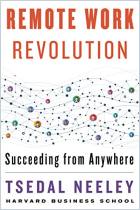Únase a getAbstract para acceder al resumen.

Únase a getAbstract para acceder al resumen.
David Pachter
Remote Leadership
How to Accelerate Achievement and Create a Community in a Work-from-Home World
Amplify, 2021
¿De qué se trata?
Working from home is here to stay.
Recommendation
Who wouldn’t want to work from home? You set your own hours, and don’t have anyone on your back, ordering you to work faster or to do things differently. Despite its advantages, however, being remote isn’t the perfect work solution for many employees. Those who work from home may miss opportunities to advance, network, socialize and connect to their company’s culture. David Pachter, a work-from-home authority, covers the downsides and the delights of having a remote job.
Summary
About the Author
In addition to being the co-founder and executive chairman of JumpCrew, David Pachter co-founded LocalVox and serves as the executive chairman of YouNow.























Comment on this summary